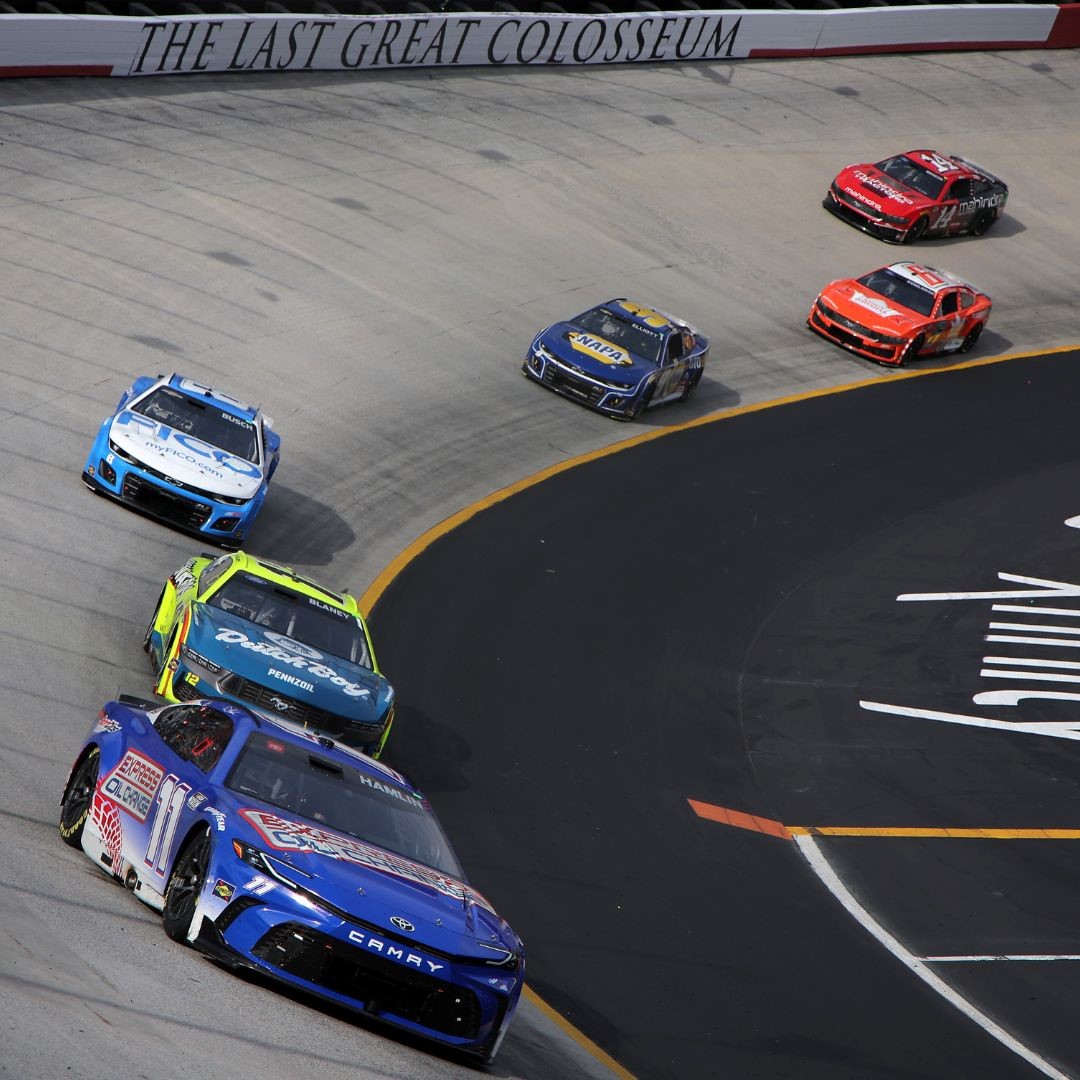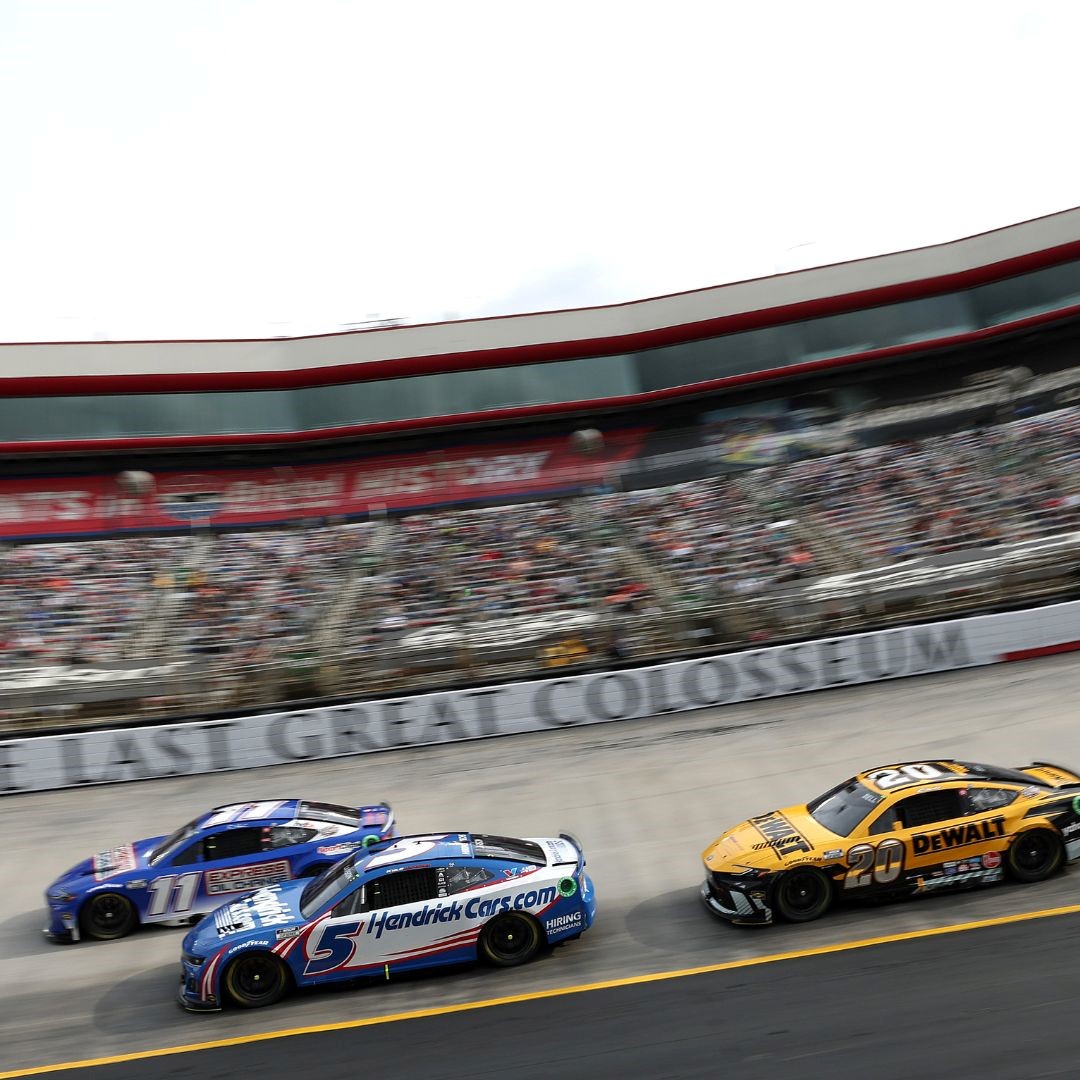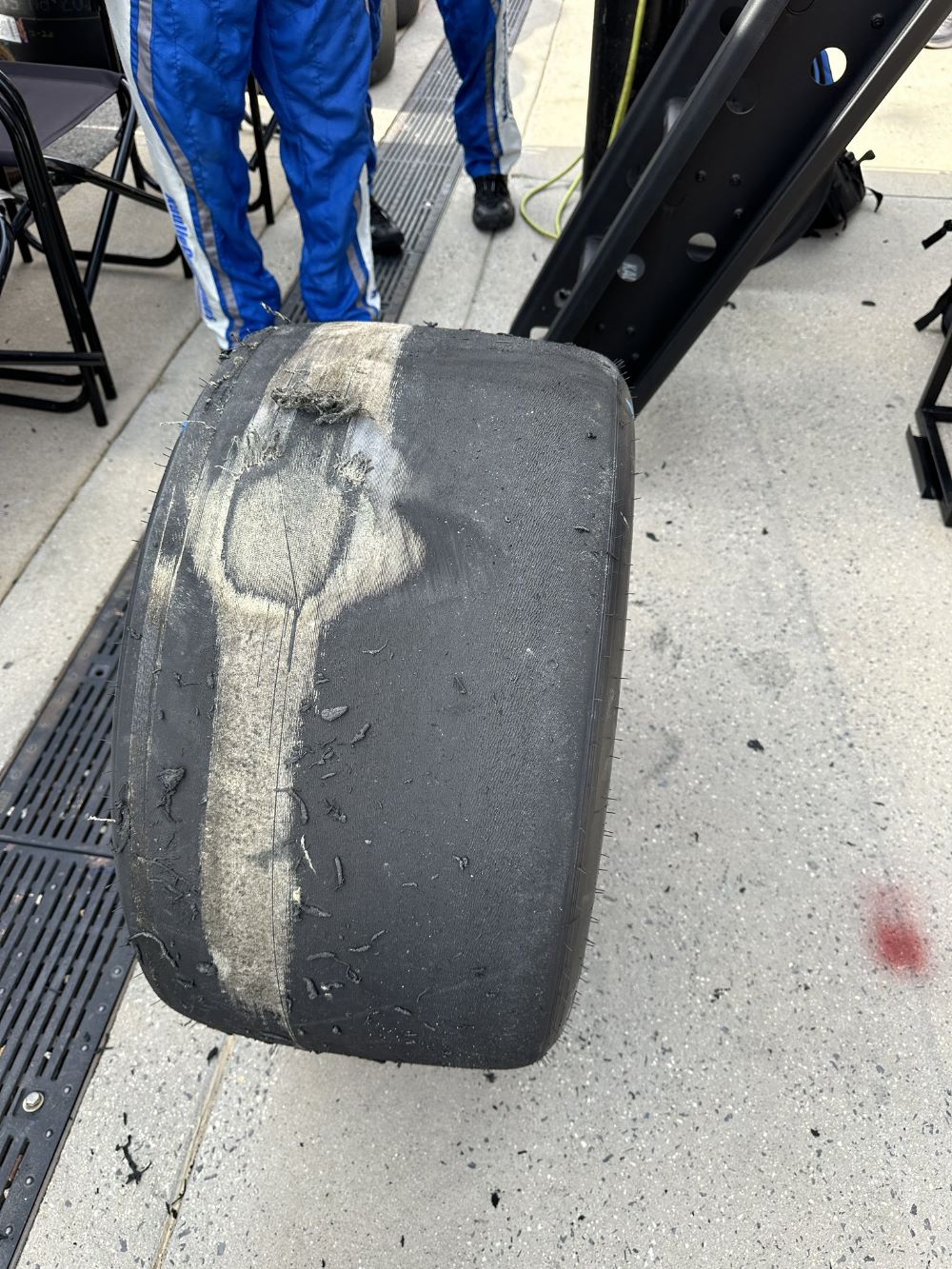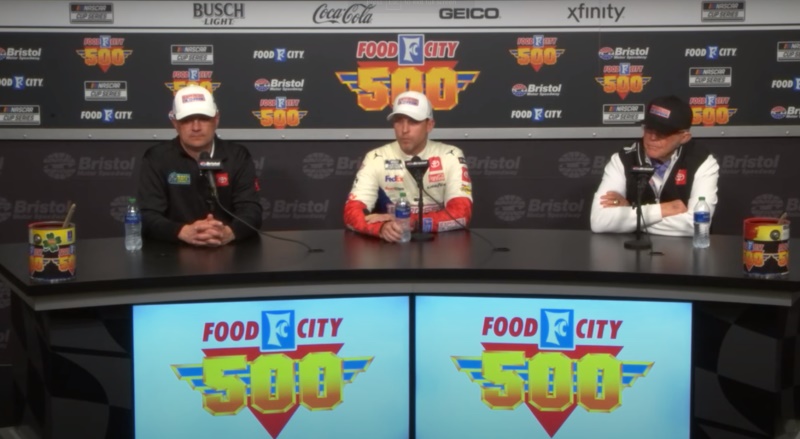NASCAR News: Bristol Food City 500 Post-Race Press Conference
NASCAR Interview with:
Denny Hamlin – winning driver
Chris Gabehart – Winning Crew Chief
Joe Gibbs – Winning Team Owner
THE MODERATOR: We’re joined by the race-winning crew chief Chris Gabehart and the team owner Joe Gibbs.
Chris, we’ll start with you. We just talked about it here, a record number of lead changes, 54, with 16 different leaders. How exciting was it or nerve-wracking on top of the box?
CHRIS GABEHART: It was fantastic. The whole weekend was nothing what any of us expected, the driver, the crew chiefs, the engineers, the pit crew, the team, the spotter. I mean, from the minute practice was over, we suspected something was going to be different. I think a lot of us thought maybe 80, 100 in, this place would rubber in and get a little more familiar. But it did not.
It was a blast. I’m not just saying that because we won. I’m saying that because it was fun to have to do something so unrefined. Everything about our business gets to be 16th of a round and 10th of an air pressure. If you just maneuver this three inches, you’ll be perfect.
It was not going to be perfect this weekend ever. I think that made for a fantastic show.
THE MODERATOR: Coach, two wins in a row now for Joe Gibbs Racing. You’re on a roll. Talk about the win today.
JOE GIBBS: We got off to I think a little bit of a slow start for sure last week at Phoenix. Couldn’t have gone better. Coming here, we love coming to Bristol. It was just one of those days.
I was really proud from the standpoint of all of our cars. I think that’s the encouraging thing, is all four of ’em at different times obviously very fast. It’s a big deal for us. When you got a sponsor like Mavis, it’s a big deal for us.
As you guys know, NZ pokies, our sport is different. You got to have a great sponsor. They’re really not a sponsor, they’re a partner in our racing. So it’s a huge deal for us to get that win.
I was calling all of the executives from the winner’s circle. Huge deal for us. Just really appreciate our guys and everybody, how hard they work.
Chris did a great job with Denny. Denny last two times coming here, it’s been really special.
THE MODERATOR: We’ll open the floor to questions.
Chris, why do you think there were issues today and not in September when it was the same tire? If they bring this same tire back in September, is it okay to have 11 sets or do you feel you need more?
CHRIS GABEHART: Well, I mean, again, everyone in this garage area, whether it’s the teams or NASCAR or Goodyear, are so good at what they do that it’s rare you have surprises anymore. Everything is so typically well thought out and calculated.
This weekend for whatever reason we just missed. We’ve seen this before. We’ve seen cold Martinsville races not rubber up. Dover last year in practice, concrete track, didn’t rubber up. Yesterday all of a sudden didn’t rubber up. There was a small change with the traction compound that got laid on the bottom. Whether that contributed or not, who knows.
My guess is we will bring something different back. I really think we have to learn from this. I mean, you’ve been hearing the drivers and the teams ask for challenges effectively. It was a challenge today.
Me personally, hats off to Goodyear. I mean, I don’t want them to get any heat for this. I think Goodyear makes million-mile tires on the road. I don’t think they should make million-mile tires on the racetrack. I want them to have to make these drivers make decisions, crew chiefs make decisions. If they blow out, that’s on the crew chief, on the team. I think that should be part of our sport to a certain degree. Force the world’s best to make decisions. I think you saw a lot of that today.
Chris, what is it like managing a race like this atop the pit box?
CHRIS GABEHART: Yeah, I just asked Coach on the way over. It’s such a rare thing to have a two-time Hall of Famer in two different sports as your boss, right? I always rib him about things in the NFL, things he experienced. I asked him if he’s ever had to call an entire game where he realizes in the first quarter, the entire plan, you have to throw it out the window because it’s going so far off script it’s not going to apply anymore. That was the whole weekend.
Yes, it’s still Bristol. You have to pay attention to certain aspects of the track, how to tune your car to that. No one planned for the track to be this different. It’s very little about simulation.
In a lot of ways it goes back to late model racing because it’s so unrefined that you got to start thinking through it creatively ’cause your simulation tools weren’t planning on this. That makes it a lot of fun.
THE MODERATOR: We are now joined by our race winner, Denny Hamlin. Fourth win here at Bristol Motor Speedway. How challenging was it out there for you today?
DENNY HAMLIN: Yeah, it was challenging. A different kind of challenge, for sure. Certainly not something we’ve had to do for a very long time in managing tires.
Lesson learned early on. I kind of ran a certain pace, a certain line, wore my tires out. From that point on made some adjustments internally. He made some adjustments to the car that allowed me to just manage it from that point on.
Once it got into that tire management type of race, certainly my history in late models where you had to do that big-time certainly paid off.

THE MODERATOR: We’ll keep going with questions.
Was this something you’d like to see on a regular basis, every short track race?
DENNY HAMLIN: I mean, listen, certainly most of the answers you’re going to get from me today are going to be from a biased standpoint, right? We won the race. There’s probably a handful that hated what happened.
I think if you change nothing, if you change absolutely nothing with the tire, nothing with the resin, we came back next week, many teams would make big adjustments for their cars to help with tire wear, and drivers would make adjustments. It would automatically get better no matter what.
Do we want them wearing out in 40, 50 laps? No. That’s probably a little bit on the low end, for sure. But certainly this is what happens when you get tire wear. There’s comers and goers. I guarantee you, surely you guys at NASCAR have sent out a stat pack of all the passes that happened today. There was times where I was leading, Ty is just pressuring me. I’m like, No, it’s not time. Go ahead. That’s how it used to be. It really used to be that way.
It was fun from my standpoint because obviously I had a good car that helped me do what I needed to do.
CHRIS GABEHART: My answer to that is the same one I kind of alluded to earlier.
Honestly, while it’s hard on us, yes, it’s supposed to be hard. You’re supposed to see these guys struggle. You’re supposed to see the 25th-place car look like a mess, and the team’s trying to figure out how to rebound and rally, help him understand where this run management didn’t work or the leader is running too hard this run. Tell your driver, You weren’t in the lead this time, this happened, let him adjust inside.
It’s supposed to be hard. This is not supposed to look easy. I think this is what you see what you make it hard.
DENNY HAMLIN: This is the first time the driver played a huge role in a long, long time. Long time. It’s a different philosophy from what we’re used to, which is everyone is just kind of on the gas all the time running the bottom, the shortest way around.
Technique was a huge deal today.
Both of you have already mentioned this harkens back to the late model background that both of you had. Without giving away trade secrets, what kinds of things through the course of that race are you leaning on, pulling from your brain in order to make that successful?
DENNY HAMLIN: He did a great job of just updating me with every pit stop what was going on with the tires. Hey, this was this amount of run, how many laps. This tire was corded, this tire was corded. Just letting me make adjustments from there. That’s really what he did great.
It allowed me to do my job at a high level when you have that kind of information. Certainly he just kept making the car better, as well.
It’s not all driver. You have to have a car that is easy on the tires, as well. They just did a great job building me that today.
CHRIS GABEHART: Yeah, again, it’s so far off the playbook from what anyone was expecting when the lift gates opened Saturday morning. No one. There’s not a single driver, single crew chief, engineer that planned on this.
You calibrate your entire world around a certain set of parameters for Bristol. It was pretty clear right after practice, again pretty clear after 80 laps into the race, all of that had to go out the window.
Now it’s instincts. A lot of your prep work, tools and planning, for the most part, are invalid. It’s still a race car. It’s still got an engine, driver, four black things on it for a while till they turn gray. It’s way different. You have to go off instinct every part of the race. That’s everybody. That’s the tire guy, the car chief, the mechanics helping.
I mean, we went through so many tires. Every 40 laps those guys are having to get data off the tires, get the information to me so I can get it to him, get the next set ready to go. Goodyear released another set. We have to go get it, match that set up. We don’t just bolt them on the car. There’s a lot that goes into what did we get, how does it match up with the tires we have, when do you want to use these, use your qualifying scuffs. It had it all, and that really makes it fun.
Would you call a race like this a chess match where you’re having to plan a couple moves ahead and know where you want to be at the end rather than just where you are in the moment?
DENNY HAMLIN: Yeah, for sure. Mainly it was when I was controlling the race and leading. I just had a certain pace. Looking at the dash, here is the lap time. He would keep me updated, You’re running a little quicker this time. He did a good job of kind of reeling me back in.
It was a chess match. There was a time where me and the 5 was up front. I was on the outside. He was leading. I could tell he was just really going slow. I told the spotter, Hey, if we want to run side by side, I’m good like that, block up both lanes, block the whole field. I didn’t realize till later the line I was running was just killing my tires (laughter).
You learned on the fly. You just made adjustments. Each run we made, we just got a little better.
Chris, you mentioned we have to learn from this. Are you talking about the sport or the team? What needs to be learned?
CHRIS GABEHART: In my opinion, the sport needs to learn from this. Again, I’ve been saying for a while from my little microphone when anyone asks is that we got to stop talking badly about Goodyear in these situations. This is not bad. Goodyear can make a million-mile tire that I have on my car when I get to the airport and drive home. It’s fantastic. I never have any trouble with it.
This is supposed to be sport. It’s supposed to be hard. It’s supposed to force these guys to make decisions in the car. Do I go now? Do I not? The crew chiefs to make decisions on how they treat the tire, what their setup is, how long do you want to run this stint. You can’t just run the fuel tank out and the tire not blow. It might blow on you.
That last green flag stopped when we called him in, I can’t tell you how stressful it was. If NASCAR throws a caution when I’m on pit road, I’m in a lot of trouble. He knows it. But he’s telling me, Hey, this tire is about to blow out.
Finally you look up and you’re thinking strategy the whole time. I’ve ran this many green flag laps, there will be this many till the end. Who is pitting, who is not. We looked like a jalopy out there compared to cars with tires. You’re trying to manage all that.
That right rear tire wasn’t going to make it two more laps and we would have had a flat tire like so many others. What I want everyone to understand is that is not bad.

DENNY HAMLIN: Don’t overreact.
CHRIS GABEHART: It’s not bad. It’s okay. Quit beating Goodyear up over things like that. They’re supposed to be part of the sport and make it hard on us. I think that’s the narrative we’ve got to start talking about.

DENNY HAMLIN: When he talks about what to learn, certainly there’s something that was different, whether it be the resin or the tire or something that was different from the last time we raced here. I think the resin was supposed to be different.
Whatever happened in the mixture department maybe at Goodyear, that’s something certainly that could be used, maybe not to that extent, but it could be used. I think they have to figure out what in their process changed from this batch of tires versus last, just cut it back a little bit.
CHRIS GABEHART: That’s very well said. What you don’t want it to be is an accident. Goodyear will tell you they didn’t expect this. So you want to learn from it in the sense that how did we do this and how can we monitor that and change it and make it something a little less extreme, then apply it to other racetracks.
I mean, there’s a lot to be learned in it.
Denny, for somebody who has won 52 races, won here before, when you talk about having an impact that you hadn’t had in a long time, what does this win mean for you?
DENNY HAMLIN: Way more proud. I know I had such a huge role in the result. If the car was not good, I wasn’t going to win. But I feel like I played a huge factor in the result.
It’s really a proud one for me. Certainly one of the more proud ones I’ve had in my career, no question.
Blaney compared it to Daytona where you’re working on fuel mileage. Other people will calling it an ‘S’ show. If that tire had blown, would you be bitter, have a different feeling?
DENNY HAMLIN: I would have simply pitted sooner. The good news, I mean, is I blew one all the way out earlier in the race, so I knew what the timetable was of, When I feel this, I’ve got a couple more laps, then this thing is not going to hold air anymore.
He did a really good job calling me in when I said, Red flag, we’re in big trouble here. It happened so quick (snapping fingers).
CHRIS GABEHART: The other thing everyone has to understand, during that time frame, we’re pitted right off of turn four. It’s loud. Lambert is driving them through traffic. We’re talking with engineers, pit crew. There is so many voices in my head in that instant that him telling me and me managing to actually even hear it let alone process what he said, how he said it, how urgent is it, it is hard.
Listen, we had a great car. Denny drove a great race. How would I feel if we ran 10th or 15th? I can tell you one thing, I would have said, Man, that was hard. And that’s good. I don’t want to hear…
It’s supposed to be hard. It’s not supposed to be easy for all of us to manage, who air blocked the best. I want it to be hard, and that was hard.
Denny, if they find a tire that maybe lasts just a little bit longer, would that end the horsepower discussion?
DENNY HAMLIN: Hmmm… Yeah, we didn’t need any more horsepower today.
CHRIS GABEHART: I watched plenty of throttle traces. Barely used all of it for a lot of the race.
DENNY HAMLIN: It’s an equation. Horsepower to tire, right? It is off-throttle time. When you have off-throttle time, that is an opportunity for me to drive in deeper than the other guy and make a pass. When we’re all matting it, driving all the way till we get to the corner, there’s no off-throttle time, there’s just no passing.
Today was seconds of falloff. It was incredible. I certainly wasn’t believing what I was seeing.
CHRIS GABEHART: I’m telling you, I was thinking about a hundred laps into the race, when is the last time 18-second lap times were run with a Cup car at Bristol. I can’t pinpoint it. Except the picture over there on the wall. I bet that was the last time a Cup car ran 18 seconds around Bristol, which is great. It provides so much opportunity for these guys to make it work or screw it up.
Coach, before the race you mentioned about some of your favorite memories here at Bristol. How would this one rank with the win here tonight?
JOE GIBBS: It was definitely different, something I’ll definitely remember. One thing I want to emphasize, the other place where it was a real test was pit road. I was really concerned about that, the fact that you got that many stops you got to make. Those guys had to really perform.
Appreciate that. It takes a total effort. I appreciate Toyota, all they do for us as a partner. Just I think the whole night was really a great team effort by everybody.
Denny, at one point in the race early on when tire wear became the big issue, you and a handful of other drivers started really kind of pacing the race a little bit. At times you ended up having a lot of cars stack up behind you. How stressful does that become?
DENNY HAMLIN: Yeah, Ty was one of ’em. He was super aggressive wanting to go. I really wasn’t wanting to go. I probably should have just kind of let him go earlier, but I want to kind of control the air on the front of my car as long as I could.
The negative to it is you get shuffled out to the outside line, you got everyone behind you, you’re going to wear your tires out guy getting shuffled out. It was a balance for sure.
I felt comfortable enough in feeling how much slip I had when I was getting into the corner to know how much am I really pushing this. It was very interesting how strategic it was and how hard you wanted to run.
Certainly if someone wanted to, they could have blasted from last to first, but they would have gone many laps down and blown a tire. Many times we would lose track position because of something on pit road getting blocked in. We’d just go right back to the front. I’d get back in line and just wait.
It was fun in that aspect, but certainly a chess match.
Coach, your team led 383 of the 500 laps today. You were running 1-4 for a main part of the closing stages of race. Ty won both stages. Can you talk to how you all planned for this race. To be as dominant of an operation as y’all were today is significant.
JOE GIBBS: I think our sport is really, really hard. When you sit in those technical meetings tomorrow and you hear the engineering group, the crew chiefs and everybody… I think that’s why the fans like it. You’re on pit road. That’s going to be a major test. I don’t know how many pit stops we had, but there were a bunch. The technical aspect of the car…
Right off the bat when we started having tire trouble, I heard Chris go, Okay, this tire’s 45 or 48 laps. He started planning, This is where it’s going to go for the rest of the race.
It was totally different. But I think if you think about our sport, you go short track, we’re going to go road racing next week, we’ve been to restrictor plate. There’s a lot to it. In order to be winding up coming out at the end of the year to be a champion is a huge deal, just to win a race. 400 laps, holy mackerel, this has been forever. So many changes and everything.
Anyway, I think it was a testament today to how it takes a lot of things going together in our sport. Our sport is really hard.
THE MODERATOR: Gentlemen, congratulations and good luck next weekend.
